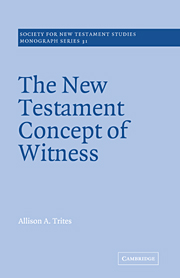Book contents
- Frontmatter
- Contents
- Preface
- Abbreviations
- 1 Introduction
- 2 The witness terminology of secular Greek
- 3 The witness terminology of the Septuagint
- 4 The use of controversy in the Old Testament
- 5 The controversy in Isaiah 40–55
- 6 The idea of witness in other Jewish writings
- 7 The witness terminology of the New Testament
- 8 The concept of witness in the Fourth Gospel
- 9 The concept of witness in the Book of Acts
- 10 The concept of witness in the Book of Revelation
- 11 The idea of witness elsewhere in the New Testament
- 12 Conclusion
- Appendix The use of witnesses and evidence in rabbinical literature
- Bibliography
- Index of references
8 - The concept of witness in the Fourth Gospel
Published online by Cambridge University Press: 18 December 2009
- Frontmatter
- Contents
- Preface
- Abbreviations
- 1 Introduction
- 2 The witness terminology of secular Greek
- 3 The witness terminology of the Septuagint
- 4 The use of controversy in the Old Testament
- 5 The controversy in Isaiah 40–55
- 6 The idea of witness in other Jewish writings
- 7 The witness terminology of the New Testament
- 8 The concept of witness in the Fourth Gospel
- 9 The concept of witness in the Book of Acts
- 10 The concept of witness in the Book of Revelation
- 11 The idea of witness elsewhere in the New Testament
- 12 Conclusion
- Appendix The use of witnesses and evidence in rabbinical literature
- Bibliography
- Index of references
Summary
The Fourth Gospel, like Isaiah 40–55, is of particular importance for it presents a sustained use of juridical metaphor. Here we must ask what is the issue being debated, who are the participants in the debate and what is the outcome.
The issue under debate is plainly the Messiahship and divine Sonship of Jesus. It is mainly to convince his readers of this proposition that the Evangelist has written his Gospel: ‘But these are written that you may believe that Jesus is the Christ, the Son of God, and that believing you may have life in his name’ (Jn 20: 31). Now it is possible, as Professor Moule has noted,
to interpret this as applying to those who have already come to believe, in the sense that the aim is to deepen or make constant that belief… But on the whole there is a strong case for the view that the Fourth Gospel is more intelligible as a skilful apology…than as primarily intended for the full believer.
Similarly, Professor van Unnik has remarked that ‘John did not write for Christians in the first place, except perhaps in chs. 13–17 which show a somewhat different character… His book was…a mission-book which sought to win.’ As Renan said a hundred years ago, the Fourth Gospel evinces ‘the desire to prove a thesis, and to convince adversaries’. It has a definite case to present: ‘briefly, the purpose of John's Gospel is to prove to his readers who Jesus is, and that faith in him means salvation’.
- Type
- Chapter
- Information
- The New Testament Concept of Witness , pp. 78 - 127Publisher: Cambridge University PressPrint publication year: 1977

